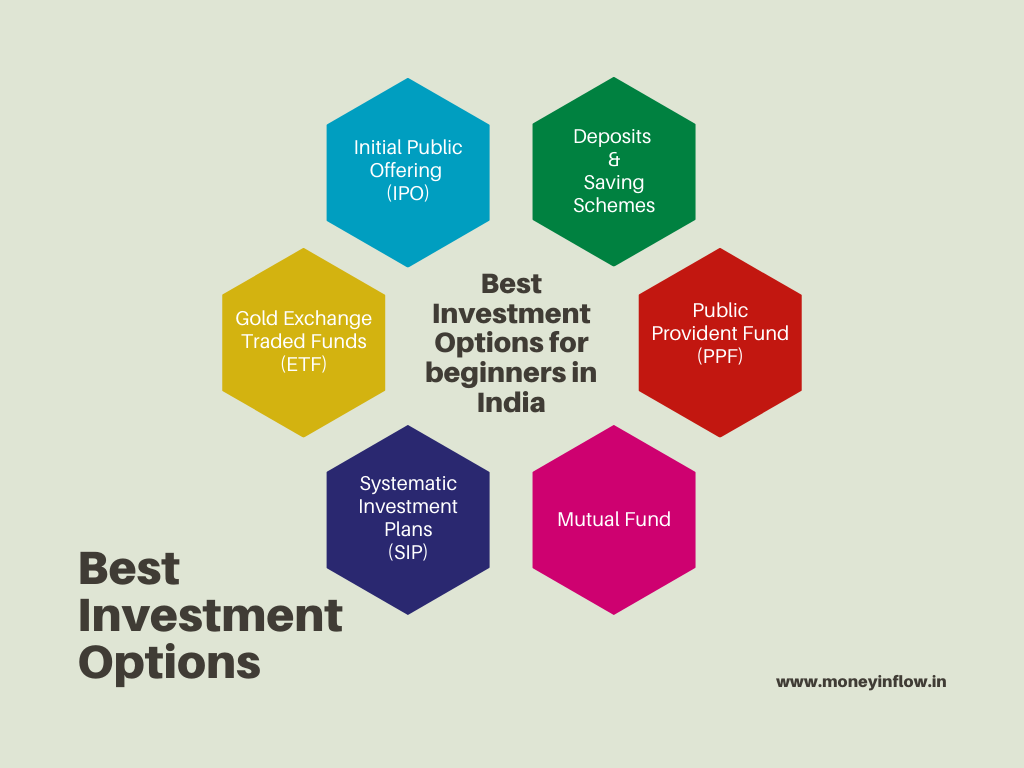
During my day to day interaction with my clients , Friends a lot of People Ask me
“I want to start investing, where can I invest my money for 1 year?”
“I want to save Rs 2 lakh for an emergency like medical expenses, where can I keep my money?”
“I just want the best option to invest my money where I have the freedom to take out whenever I want”
Before we jump straight on to the best investment options for beginners in India.
I would want you to understand the basic terms and concepts for a better understanding of the subject.
I have structured this article in three sections to make it easy to understand.
- What is an investment?
- Types of Investment
- Best Investment Options for Beginners in India
1. What is an Investment ?
In simple words, an investment means buying an asset (House, Flat, Plot, Shares, Gold, Mutual fund) with the intention that the value of the asset will increase over a period of time, and the investor will generate a return on investment.
When an investor invests, it always requires a sacrifice of some present asset that they own i.e., time, money, or effort.
An investment can be a short-term investment or a long-term investment from a time horizons point of view.
As we all know that rewards are directly related to risk, we all are familiar with the “High Risk, High Reward” theory.
Every investment expects a return. Return on investment is directly linked with the risk involved in the investment.
No investment is 100% secure or risk-free. There are 3 types of investment based on risk involve.
- High-risk investment,
- medium-risk investment, and
- low-risk investment.
We will discuss it in detail under types of investment.
Any investment which is made with a time horizon less than or equal to one year is considered a short-term investment. Fixed deposit for one year, buying a share, and selling on profit before 12 months are also short-term investments.
Buying IPOs for listing gain and selling soon after a profitable listing is an example of a short-term investment.
An investment that is made with more than one year investment period is considered a long-term
investment.
The time period of such investment can be any between 13 months to 15 years.
PPF is a long-term investment as you can’t withdraw funds before the maturity of 15 years.
Buying an IPO and keeping for 5 years, 10 years, and 15 years, buying mutual funds through SIP is a long-term investment.
Long-term investment has the power to compound the interest and always return on such investment is more as compared to short term investments.
2. Types of Investment
Every investment has risk involved. There are 3 types of investment based on the risk associated with the investment.
- Low-Risk Investment
- Medium Risk Investment
- High-Risk Investment.
1. Low-Risk Investment: An investment in which the chance of losing your money in full amount or in very small amount is very less is considered a low-risk investment.
Low-risk investments earn lower returns than you could find elsewhere with risk, and inflation can erode the purchasing power of money stashed in low-risk investments.
i.e., High Yield saving account, Fixed Deposits.
2. Medium Risk Investment:Investments that are less risky, with strategies for high returns are considered medium-risk investments. Blue-chip stocks, residential properties.
This kind of investment is beneficial for people who are in the age of getting retired soon and can afford to take a little calculated risk.
3. High-Risk Investment: In high-risk investment chances of under performing, the investment is lost in full amount or in small amount is higher than average.
This kind of investment offers potentially large returns to investors for accepting the risk associated with the investment.
IPOs, REITs, Currency trading are an example of high-risk investments.
3. Five Best Investment Options for Beginners in India

As a beginner to investment, one should always start with a low-risk investment. Every single rupee saved and investment is also money earned.
These are the 5 best investment opportunities available in India for beginners, students, and freshers.
1.Recurring Deposits / Fixed Deposits / Post Office Monthly Saving Scheme:
Before we start investing, we need to learn to save money.
Its strongly recommend that beginners should open a monthly saving account with a bank or post office in India, where you can deposit every month from your salary or pocket money or money you have earned with side hustles.
Anyone above the age of 18 years can open an account and start such saving with an amount as low as Rs. 500/- a month.
Interest in these saving schemes is low. It varies from 4%-8%.
These kinds of investments are low-risk investments, where investors will not lose one’s capital. Beginners should use these schemes for the short term.
Once you have a minimum corpus created this can be used either to invest in less risky medium risk investment as a one-time investment amount or to keep aside as an emergency fund.
2. Public Provident Fund – PPF
PPF Stands for Public Provident funds. It’s one of the most popular long-term saving schemes with a focus on including small savings like investments and accrue returns on them.
PPF investment is a 100% risk-free investment. It is backed by the Govt. of India’s small saving scheme.
A PPF account has 15 years maturity period. It can be extended in blocks of five years.
PPF account is a long-term investment and interest earned in the account is free from Income Tax
under Section -10 of I. T. Act.
All deposits made in PPF account up to Rs 1.5 lakh in one financial year qualifies for deduction
under Section 80-C of I. T. Act.
Click here to read more in detail about PPF.
3 . Mutual Fund / Systematic Investment Plan – SIP
Mutual funds are safer and more secured compare to buying stock directly in the market for beginners.
A mutual fund is a better option for investment during this unprecedented time.
Mutual fund investments are long-term investments. It’s advised to choose the SIP method to invest in a mutual fund. SIP helps in averaging the buy cost of units.
It’s recommended that one should not invest the full amount in one type of mutual fund scheme.
Most beginners make the common mistake due to a lack of understanding of mutual fund schemes. I have started to work on mutual funds knowledge sharing and you will find my blogs on mutual funds soon. meanwhile you can refer mutual funds sahi hai
4. Gold Exchange Traded Funds – ETF
For investors who are looking for a cost-effective option to invest in Gold, then Gold ETF is considered to be the right choice.
A Gold ETF is an exchange-traded fund (ETF) that aims to track the domestic physical gold price.
Buying Gold ETFs means you are purchasing gold in an electronic form.
ETF investments a systematic approach by investing in ETFs via SIP.
Click here to check list of gold exchange traded fund.
5. Initial Public Offerings – IPOs
IPO stands for Initial Public Offering.
IPO provides an opportunity to buy shares of a credible company at the cheapest possible price before these stock gets listed and become popular.
IPO offers short-term gains opportunities to its investors immediately after being listed in the exchanges.
Fundamentally strong companies offer market-beating returns on your IPO investment over the long term.
IPOs are considered to be a risky investment since there is no historical data for a stock is available to decide and take a firm call.
Is IPO a good investment? there is no straight answer “Yes” or “No” to this question.
Indigo paints have given a 100% return on the listing.
Equitas Bank and Laxmi Chemicals have given a return of 100% in six months of its listing.
IRFC has not given or has given negative returns since its listing.
Disclaimer : We are promoting financial literacy in India. The content published is purely for educational and general information purpose. We are not a SEBI registered financial advisor. Hence, we are not providing financial and investment advisory services.
You are and will be solely responsible for your own money and decisions you take. Please consult a SEBI registered advisor for any kind of investment / financial advice.
I was able to share some basic information on investing. if you like this article and feel like your friend can be benefited out of my blog. do show you love by sharing this with them.

